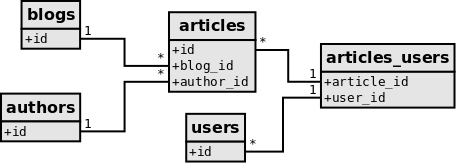Query builder
In this guide, we will go through functionalities provided by SimpleAR's query builder.
The major part of this guide will explain how to use query builder to construct
SELECT queries, since it is the most used query type.
We'll see how to construct other statements at the end.
Accessing builder instance
You can get a new query builder instance for a model using the query() method.
$qb = Article::query();
$qb->one(); // Or first(), last(), all().Conditions
Simple conditions
Query builder provides a good collection of method to add conditions on data to retrieve:
Article::query()->where('author_id', 12);Fortunately, you don't have to use query() method every time you want to build a query:
Article::where('author_id', 12);
Article::where('author_id', '=', 12); // Same as aboveAttribute-value conditions
Basic where methods
MyModel::whereNot('attr', 'val'); // NOT `attr` = 'val'
MyModel::andWhere('attr', 'val'); // AND `attr` = 'val'
MyModel::orWhere('attr', 'val'); // OR `attr` = 'val'
MyModel::andWhereNot('attr', 'val'); // AND NOT `attr` = 'val'
MyModel::orWhereNot('attr', 'val'); // OR NOT `attr` = 'val'Where null
$query->whereNull('author_id');
// <=>
$query->where('author_id', null);WHERE `author_id` IS NULL$query->whereNotNull('author_id');
// <=>
$query->whereNot('author_id', null)
// <=>
$query->where('author_id', '!=', null);WHERE `author_id` IS NOT NULLConditions over attribute tuple
// (You can use where() method too.)
$query->whereTuple(['author_id', 'blog_id'], [[1,2], [1,3], [2,3]]);WHERE (`author_id`, `blog_id`) IN ((1,2), (1,3), (2,3))Alternative syntax:
$query->where('author_id,blog_id', [[1,2], [1,3], [2,3]])Will produce the same as shown above.
Attribute-attribute conditions
Article::whereAttr('comment_count', '>', 'view_count');WHERE `comment_count` > `view_count`Nested conditions
Use the whereNested method:
Article::whereNested(function ($q) {
$q->where('author_id', [12, 13, 14])
->andWhere('blog_id', 1);
})
->orWhere(function ($q) {
$q->where('title', 'Alice in Wonderland')
->where('blog_id', 3);
});WHERE (
`author_id` IN [12, 13, 14] AND `blog_id` = 1
) OR (
`title` = 'Alice in Wonderland' AND `blog_id` = 3
)
whereNested() is the method that handles nested conditions; but
where() will get it as well (by delegating to
whereNested()).
Use whatever method you prefer!
Conditions over relations
This is really easy and intuitive to perform conditions over linked models in SimpleAR. This section demonstrates it.
Here is the schema I will use in my examples:

Here is the corresponding classes and their relations:
class Blog extends SimpleAR\Model
{
protected static $_relations = array(
'articles' => array(
'type' => 'has_many',
'model' => 'Article',
)
);
}
...
class Article extends SimpleAR\Model
{
public static $_relations = array(
'author' => array(
'type' => 'belongs_to',
'model' => 'Author',
),
'blog' => array(
'type' => 'belongs_to',
'model' => 'Blog',
),
'readers' => array(
'type' => 'many_many',
'model' => 'User'
),
);
}
...
class Author extends SimpleAR\Model {}
...
class User extends SimpleAR\Model {}Now we have everything we need, let's explore what query builder can offer!
Condition on linked model's attribute
Every attribute condition method (seen above) handles attribute of linked models.
This means that the following is valid:
// Blogs where John Doe has written articles.
Blog::where('articles/author/first_name,last_name', ['John', 'Doe']);
// Blogs where no article has been viewed more than 100 times.
Blog::whereNot('articles/view_count', '>', 100);This syntax is valid with every method seen in Simple conditions section.
The character "/" is the default relation separator character. You can change
it with queryOptionRelationSeparator configuration option.
Condition on linked models
Blog::whereHas('articles');
// With negation
Blog::whereHasNot('articles');Article::whereHas('readers', '>', 1000);Blog::whereHas('articles', function ($q) {
$q->where('author_id', 12);
});Blog::whereHas('articles/readers');
// is equivalent to:
Blog::whereHas('articles', function($q) {
$q->whereHas('readers');
});Aggregates
// Blogs of which articles readers' average age is greater than 30.
Blog::where(DB::avg('articles/readers/age'), '>', 30);Smooth!
There are some built-in methods like DB::avg(): sum(), count()... But if
the one you want doesn't exist, you can use fn() and give it the SQL
function you want to use as first parameter:
// Blogs created before 2010.
Blog:where(DB::fn('YEAR', 'created_at'), '<', 2010);Raw conditions
If none of the available methods is sufficient to build your query, you can use
the whereRaw() method:
Author::whereRaw(DB::expr("first_name LIKE 'Joe'"));If you have to use relations in your query, note that:
- The relation must be included. To manually include a relation, use
join()method; - Relations are dot-separated in the query string:
- Alias for root table is
_(underscore) character.
Article::join('author')->whereRaw(DB::expr("author.first_name LIKE 'Joe' AND `_`.`views` > 100"));Select statements
Article::where('author_id', 12)
->orderBy('title')
->limit(10)
->offset(20) // Or: limit(10, 20)
->all();You can use one(), first(), last() instead of all() if you want just one row.
By default, Query builder return all columns of your table. So if you want just some field, do it like this
Article::where('blogId', 12)
->all(array('author_id', 'title')); // Or one(), first(), last()SELECT id, author_id, title FROM `articles`;The primary key of root table are always selected
Aggregate selection
Article::where('views', '>', 1000)->count();
// 12
Article::where('views', '>', 1000)->count(DB::distinct('id'));
Article::where('views', '>', 1000)->groupBy('authorId')->count('*', 'articleNb');
// array(
// array(
// 'authorId' => 1,
// 'articleNb' => 5,
// ),
// array(
// 'authorId' => 2,
// 'articleNb' => 3,
// ),
// ...
// );There are several built-in aggregate methods (min, max, sum, avg,
count); but if it not sufficient, you can use the generic aggregate method:
Article::where('blogId', 12)->aggregate('AVG', 'views', 'avg_views');SELECT AVG(`views`) AS `avg_views` FROM `articles`;If you want to add an aggregate to the selection but don't want to fetch only
that, use addAggregate() method. Its signature is the same as aggregate()
but instead of executing the query, it add the aggregate to the list of columns
to select.
Insert statements
User::insert()->fields(['first_name', 'last_name'])->values(
['John', 'Doe'],
['Karl', 'Marx']
)->run();Update statements
User::update()->set('first_name', 'Foo')->where('last_name', 'Bar')->run();Delete statements
Author::delete()->whereHasNot('articles')->run();Other statements
GROUP BY
$query->groupBy('authorId');
// OR
$query->groupBy(array('authorId', 'first_name'));GROUP BY `author_id`
/* multiple group by */
GROUP BY `author_id`, `first_name`ORDER BY
The default sort direction is ASC
$query->orderBy('author_id');
// Multiple order by
$query->orderBy(array('author_id', 'first_name'));ORDER BY `author_id` ASC
/* Multiple order by */
ORDER BY `author_id` ASC, `first_name` ASCYou change the sort direction like this:
$query->orderBy(array('author_id' => 'DESC'));
// Multiple order by
$query->orderBy(array('author_id', 'first_name' => 'DESC'));ORDER BY `author_id` DESC
/* Multiple order by */
ORDER BY `author_id` ASC, `first_name` DESCYou can use some function like RAND
$query->orderBy(DB::fn('RAND'));
// OR
$query->orderBy(array(DB::fn('YEAR', 'created_at') => 'DESC'));ORDER BY RAND()
/* OR */
ORDER BY YEAR('created_at') DESC